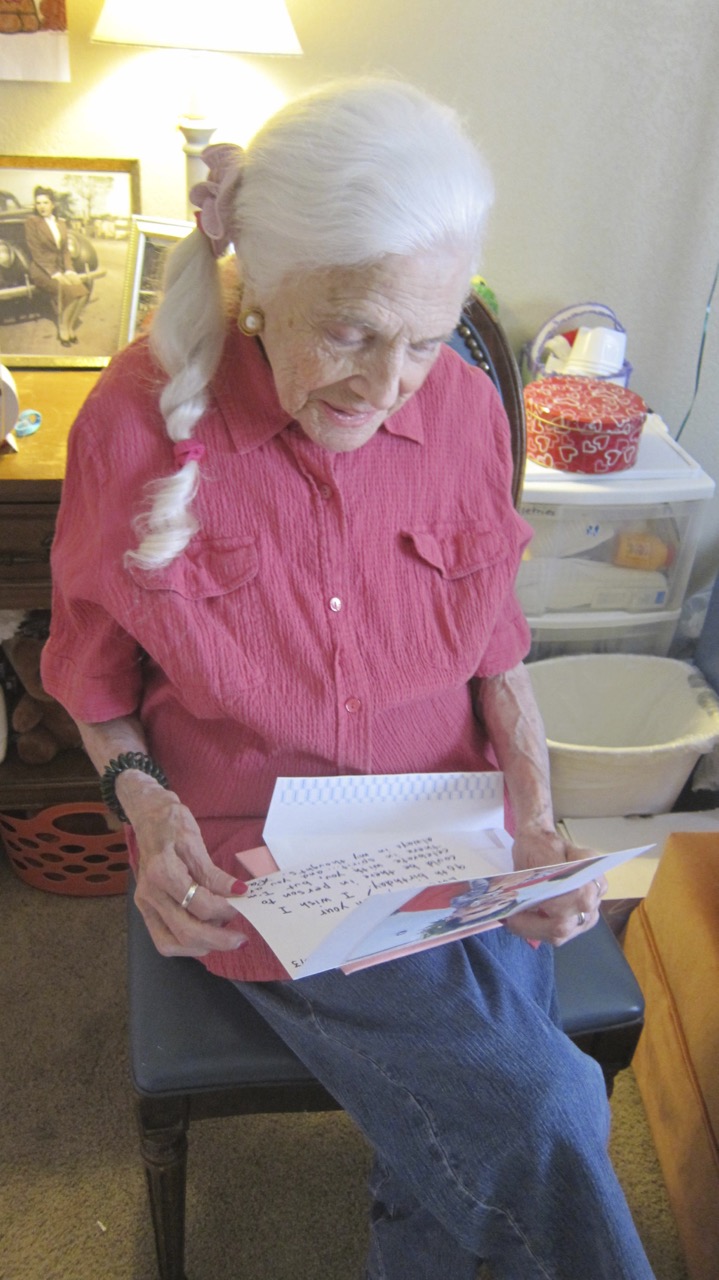My Mother's Books
In her better days, my mother loved books. Often she would remove them from the bookcase at the assisted living residence and carry them back into her room with her like stolen treasures. Whether or not she read them in their entirety, I cannot say, but she definitely turned and dog-eared pages, underlined passages, tucked little notes within, and inscribed them with her name. The books accumulated in stuck drawers, and in stacks on the verge of toppling, and periodically I would place a pile of them in a box, take them downstairs, and carefully put them back into the communal bookcase.
Occasionally I bought her brand new books I thought she’d like, the kind with large print, and she received these happily. With their hard covers and bright titles, they were an instant form of wealth and décor, palpably good and substantial, but I believe my mother also sensed that they were depots where she might catch a thought and briefly be transported. One day she actually told me that a certain novel had pulled her into another place, that she could hear the story in her mind as she read, and the characters were alive conversing on the page, keeping her company. She told me this with excitement and delight, as if it were a new discovery. I cannot even remember what book it was, but I always thought of this as my mother’s late-in-life arrival to really truly reading.
For some lucky elders, the pleasure of reading endures, a comfort through all the diminishment of old age. But as time passed, my mother’s powers of concentration faltered, her thinking became less linear, and her mind seemed mostly in the immediate present or the very distant past. She remained defiantly cheerful until her final year or two, and was always responsive to kindness, but deafness and frailty exacerbated her confusion and isolation, and her world became smaller and emptier. I know she read letters and the entries of a diary we kept together over the years, in which we printed the events of my visits to help her re-live them. I know she flipped through the pages of magazines. And sometimes I would notice a book on her lap as she sat dozing in her big green reclining chair, but I think she lost the ability to get deliciously immersed. She still liked being surrounded by books; maybe she had a memory of them as having once been companions. But now they filled the room like silent visitors, with nothing more to tell her.
I’ve been reading a lot lately as well as thinking about reading, reflecting on the books that inform us, or distract us, or inspire and help us through, and how reading becomes an enhancement to life or a parallel life and sometimes a crucial nutrient. This week I’ve been facing On Tyranny by Timothy Snyder, a slender but essential book for our time, and climbing into The Woman In White by Wilkie Collins for escape. The latter, first published in 1859, is a mystery, convoluted and compelling, told in several voices, and whenever I open it, I am swept from the everyday cares of my modern life to the brooding melodrama of Victorian England. I will miss that book when I’m finished. (Isn't it amazing that a book that was a 19th century sensation can still have such power to entertain?)
I’m also thinking a lot about my mother lately, partly because events keep triggering memories–I can see that doesn't stop happening–but mostly because I glimpse her so often in myself. I will never truly know who she was or what it all meant, but I will spend the rest of my days wondering. Sometimes I wake up in the morning and look outside, and my first thought is a wish that she too could have awakened to beauty. Or I hear my husband coming up the stairs, so vital and true, and I think of her long brave years of widowhood. But I look down at my hands, so like hers, holding a book, and I’m glad that she loved reading. I just wish the path had remained open to her longer.
